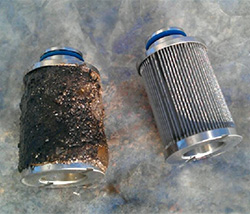Contributed by Ron Grose, Airframe Tech Rep
There are two facts operators should be aware of when it comes to fuel:

Example of a contaminated fuel filter due to microbial growth.
- All hydrocarbon fuels have micro-organisms that live and grow in them and these bugs release sulphur-based by-products into the fuel.
- All hydrocarbon fuels have water in them which, when combined with the sulphur-based by-products, release sulphuric acid into the fuel.
To help eliminate the damage which can be inflicted into the fuel tanks by these bugs, operators need to perform a couple simple processes. 1) Sump the fuel tanks on a regular basis, weekly if necessary, to remove the water and debris left from the bugs and; 2) Perform the “Fuel Contamination Detection Test” (MP 28-00-00-280-801) at every “A” inspection or more often if needed, such as in a tropical environment.
If the “Fuel Contamination Detection Test” detects a high concentration of microbiological contamination, or if the operator suspects receiving a contaminated load of fuel, Dassault recommends treatment of the fuel with Biobor JF or Kathon FP 1.5 as directed by MP 28-00-00-910-803: “Treatment of Fuel System Contamination.” Dassault has revised this procedure by eliminating the “preventative treatment” option of these biocides. They only recommend the full “lethal dosage” treatment as directed by the MP.
Note: Fuel anti-icing products, such as Prist, are known to slow the development of micro-organisms but do not eliminate these bugs. This is the reason to use Biobor or Kathon only.
During the accomplishment of the “C” inspection, we recommend the removal of all of the fuel tank sump drain valves to inspect for corrosion of the valves/mating surface along with replacement of the seals in these drain valves. Since the fuel quantity probes are removed during this inspection, to perform the borescope inspection of the fuel tanks, this is a good time to inspect the probes and wire connections to them to ensure the connections are clean and installed properly to prevent future fuel quantity indication issues. Even though Dassault does not have a requirement to perform a calibration check of the fuel quantity system, Duncan Aviation recommends performing a capacitance, insulation, and calibration check at this inspection to ensure the quantity indication system is properly calibrated.
These recommendations will help operators maintain the fuel tanks correctly to eliminate costly repairs along with fuel quantity issues in the future.
Duncan Aviation is a Dassault Authorized Airframe Service Center offering complete airframe maintenance services, specializing in major and minor airframe inspections as well as heavy structural repair and modifications.
Ron Grose is an airframe tech rep at Duncan Aviation's Lincoln, NE, facility, specializing in the Dassault Falcon airframe. Ron is often sought after to speak about technical issues common to business aircraft and has particpated in several OEM advisory boards.


